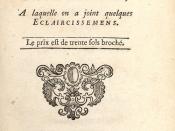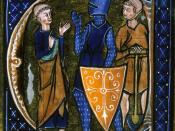Feudalism and Manorialism
Feudalism and manorialism were very linked. They go together step by step in the Middle Ages. Feudalism concerned the rights, power, and lifestyle of the military elite: manorialism involved the service and obligations of the peasant classes.
Word feudalism was invented in the 17 century by Montesquieu and popularized it in The Spirit of the Laws (1748). In the late eighteenth century people said that feudalism is the privileges of the aristocratic nobility, privileges that provoked the wrath of the bourgeoisie ((McKay, A History of Western Society 259). Later Karl Marx adopted it to other meaning. He thought that feudalism was precapitalistic society. Now people think that feudalism was social and political system held together by bonds of kingship, homage, and fealty and by grants of benefits - lands or estates given by king, lay lord, or ecclesiastical officer (bishop or abbot) to another member of the nobility or to a knight.
(McKay, A History of Western Society 270.) However it aren't all meanings of feudalism. Bloch thought that it is a whole system of life centered on lordship. Feudalism was a military society. Men dominated in it. However women was not so significant.
Feudalism had military society. Manorialism involved the service and obligation of the peasant classes. The economic power of the warring class rested on landed estates, which were worked by peasants (McKay, A History of Western Society 261). Here we can say that feudalism and manorialism is connected to each other. Nothing in our world is made for nothing. People need something to return for their service. In manorialism was the same. Peasants needed protection, and lords asked them to surrender themselves and their lands to the lord's jurisdiction. Peasants were ties to the land by various kinds of payments and service, despite of...


